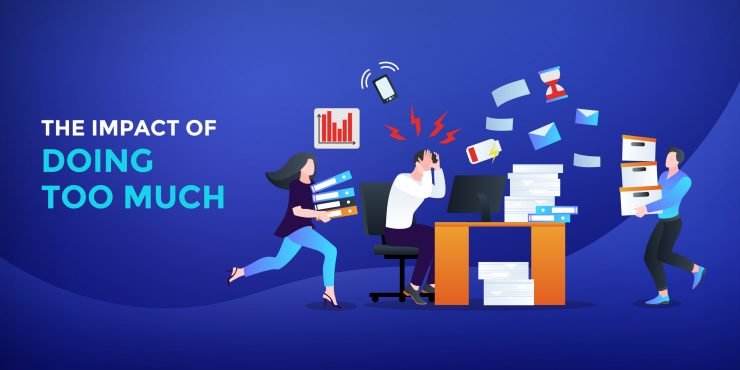You often hear people talk about how you can “never do too much” for your company.
While you can certainly contribute a lot to your company through dedicated and efficient work, there’s probably a quantifiable amount of things an employee can do before it literally is “too much.”
Trying to juggle more responsibilities than you can handle will not only hamper your own performance but can negatively impact the company you’re working for. But how much is “too much,” and how can you tell when someone at work has too many things on their plate?
In this article, we’ll be exploring the impact of doing too much at both the individual and company level, while outlining signs that workers show when they’re trying to do too much at once.
We offer this website completely free to our visitors. To help pay the bills, we’ll often (but not always) set up affiliate relationships with the top providers after selecting our favorites. However, we do our best not to let this impact our choices. There are plenty of high-paying companies we’ve turned down because we didn’t like their product.
An added benefit of our relationships is that we always try to negotiate exclusive discounts for our visitors.
Isn’t working as hard as possible good for my career?
The common perception for employees is that working as hard as possible is going to benefit them, either in the short run or in the long term. While this strategy might work in certain instances, it’s generally not the most beneficial mindset.
It’s true that sometimes an employee needs to work longer hours for a short time to meet certain deadlines. But using this mindset to frame everything you do at work is probably not going to reap many rewards.
If you’re looking to get ahead of either your own workload or your peers, working longer hours is surprisingly not a great way to accomplish this.
Feeling like you need to get a heavy load of work done in a short amount of time could indicate issues unrelated to advancing your career. It could be a time management issue, a staff problem, or something else not related to your career.
Advancing your career is not always about doing a high volume of tasks – it’s about making the right connections and finding progressive opportunities. Yes, hard work ties into that but overwork usually ties in with the demands of a specific job.
This is what people mean when they say “work smarter not harder.” Getting bogged down in your heavy workload isn’t always an indicator of career advancement. In fact, it could be hampering your productivity and performance altogether.
How doing too much impacts your performance and productivity
Poor overall well-being
The low hanging fruit for the impacts of doing too much at work is how it affects your overall well-being. Trying to do too much at your job probably means you’re working longer hours, and that has some serious effects on your body.
Studies have shown that employees who stretch themselves too thin and work overly-long hours are more likely to have irregular sleep patterns and depressive symptoms. Correlations have been made between long work hours and Type 2 diabetes, and even heart disease.
No matter who you are and what you’ve been able to push through in the past, you’re not going to do your best work if you feel completely worn down from the day before. If you want to remain a productive and high performing employee, it all starts with taking care of yourself.
Hampered communication
Doing too much at work can also affect your abilities to communicate. If your job requires you to talk to your colleagues, clients, or managers, this can be detrimental to your performance.
Research has found that overworking can negatively affect your ability to communicate. Not only does general fatigue hamper your interpersonal abilities, but the stress that often comes with exhaustion also plays a factor as well.
If you’re in a leadership role at your firm, working too much can have a negative effect on not only your individual performance but likely the performance of your entire department.
Burnout
We often hear the words “burnout” as it relates to overworking. It refers to the physical and mental exhaustion that comes with either a heavy workload or having to do too much at one time.
It leads employees to have a hard time starting their day, as something simple as beginning your first task of the week can be a chore. It leads you to feel extremely unsatisfied and critical of your own work, leading to decreased productivity and general unhappiness.
There’s nothing worse than wanting to get work done but your mind is too concerned with your fatigue to be able to get anything done. Trying to do too much at work and feeling overwhelmed can contribute to this feeling.
Poor habits
We mentioned earlier that trying to do too much at work can put you in the mindset of working harder without thinking about how you can accomplish the same tasks with a smarter strategy.
It’s easy to get stuck in these mental habits, especially if you want to perform well at your job or you have a lot of things to get done in a short amount of time. However, you can easily get tunnel-visioned into thinking that doing everything at once will instantly make you better at your job.
You might end up picking up bad habits such as volunteering to do more work even if you already have more than enough to take care of. Stretching yourself too thin can lead to worse performance.
Think about it – if you have 12 things you need to get done for your boss when your capacity is about 8, that means you’ll be producing 12 substandard products instead of 8 quality products. A heavy workload can lead to poor habits, which then leads to underperformance.
How doing too much can impact businesses
You might say that you taking up as many tasks as possible is actually benefiting your company because they don’t have to rely on more people to get tasks accomplished.
This is another misconception that individual workers hold, as one person trying to do too much isn’t actually beneficial or even noticeable to a company. A study done by Boston University found that managers could not conclusively tell the difference between employees who worked an 80 hour work week and those who pretended to do so.
Doing more and working longer hours has never even historically been proven. In the 19th century, when labor unions were finally able to negotiate shorter workdays, companies found that productivity actually increased when people worked fewer hours per day.
This mindset still applies, as Microsoft Japan experimented with getting their workers to work less by mandating shorter hours. They found that their productivity increased by 40%. A New Zealand trust and estate company tried the same workweek and found greater engagement and satisfaction.
As such, employees who believe that trying to do more at work and justify their longer hours by claiming it’s benefiting the company might be a little misguided. While there’s value in trying to do as much as you can for your business, you’ll likely reach a point of diminishing returns if you end up overworking.
More efficient work beats out putting your nose to the grindstone and hammering out work through long hours. Now that these myths about doing too much being beneficial are debunked, let’s look at how you can identify signs of doing too much in your workplace.
Signs of doing too much
Changes in employee mood and energy
If you’re an employer or a manager, it’s important to identify when an employee shows signs of changes in their energy and overall mood.
Chances are you know someone who always tends to walk into work with a positive attitude, and you might even have that “energy guy” who keeps your team's spirits up.
When these individuals are noticeably lacking that spark or seem to be slumping, that’s often a sign that they’re working too hard or are doing too much. This can have serious implications on their well being and is probably hindering their ability to do productive work.
Difficulty getting the day started
Like we mentioned earlier with burnout, employees who are doing too much work might feel overwhelmed even at the start of their day. This means they’re not able to get much done because of the stress associated with stretching themselves too thin.
If you find an employee or co-worker who is seemingly stuck doing one or two simple tasks for hours on end, it could be a sign of overworking. Try and talk to them to figure out what the problem is.
Decrease in work output and productivity
For those in charge of their own departments, you’ll likely be able to tell when a typically excellent and productive employee isn’t able to pull their usual weight.
While this can certainly be because of reasons other than overwork, it’s good to see whether they’ve got too much on their plate when this is the case. Chances are, they’ve taken on too many assignments and are completely stretched thin.
Excessive use of tools
When employees are taking on too many tasks at once, they’ll feel the need to get all the tools they need to get it all done. You can sometimes identify if an employee is doing too much just by how they’re using these tools.
Communication apps like Slack and Microsoft Teams can clue you into this. A team member using email, Slack, Skype, and multiple messaging channels (rather than streamlining communications via one system) could be overwhelmed.
Picking up too many favors
Related to the last point, if an employee is picking up work from other employees, either as a favor or because they’ve been asked to do so, it can easily lead to them doing too much.
While there’s nothing wrong with helping out one's co-workers, these actions certainly have a limit. At some point, employees will have too many tasks, and your department’s productivity will suffer as a result.
Narrow your focus – widen your potential
While it’s understandable for employees to want to do as much as they can to not only advance their goals but those of their companies, there’s always going to be a tipping point.
Knowing where your limits are and identifying signs of poor productivity due to overworking is important for keeping both you and your work environment efficient and high-powered. Leverage this article to understand why doing too much can be detrimental, and how you can spot this issue within both yourself and the people around you.
Remember: Sometimes the things that you choose “not to do” are the most important. To eliminate spreading yourself too thin, focus on the ONE THING you can do such that by doing it everything else will be easier or unnecessary. When you narrow your focus, you widen your potential to get more done.




















